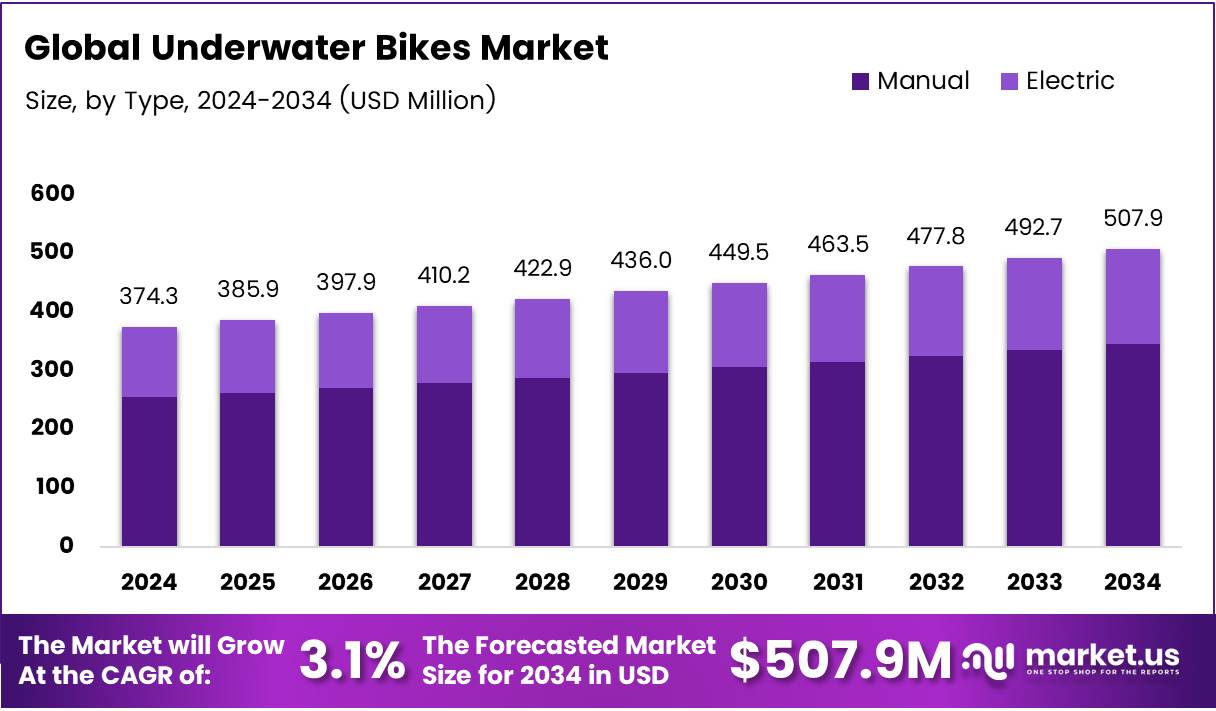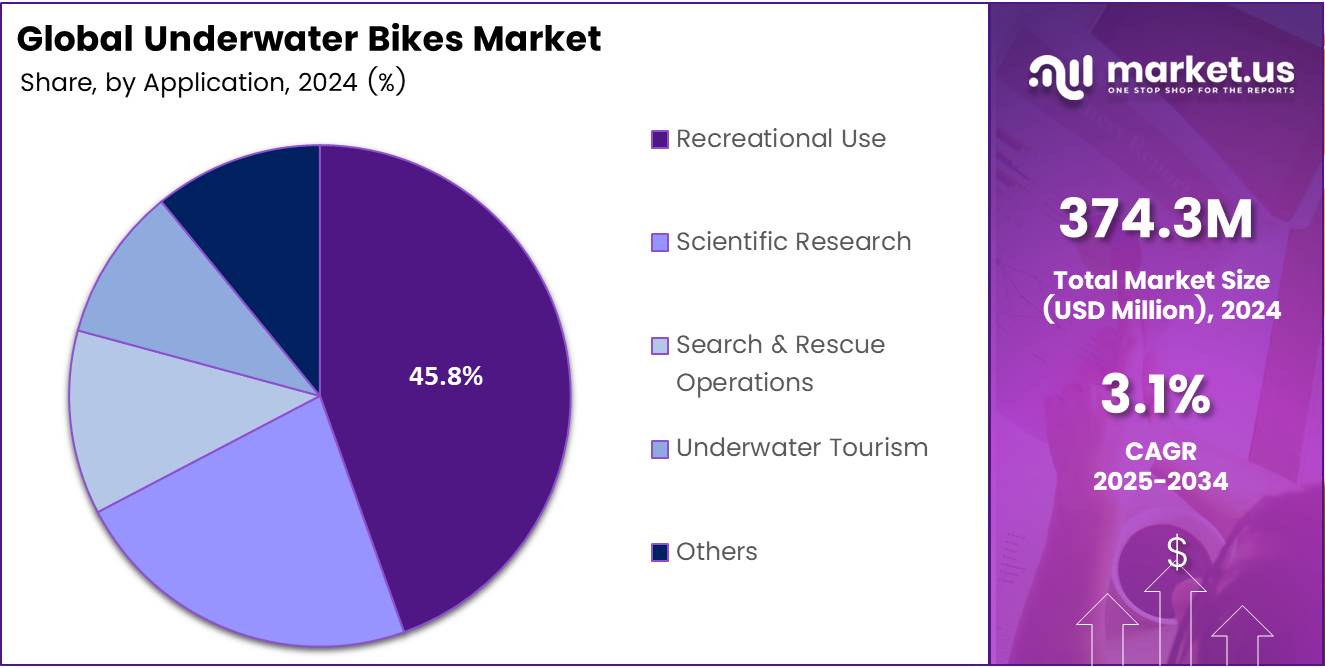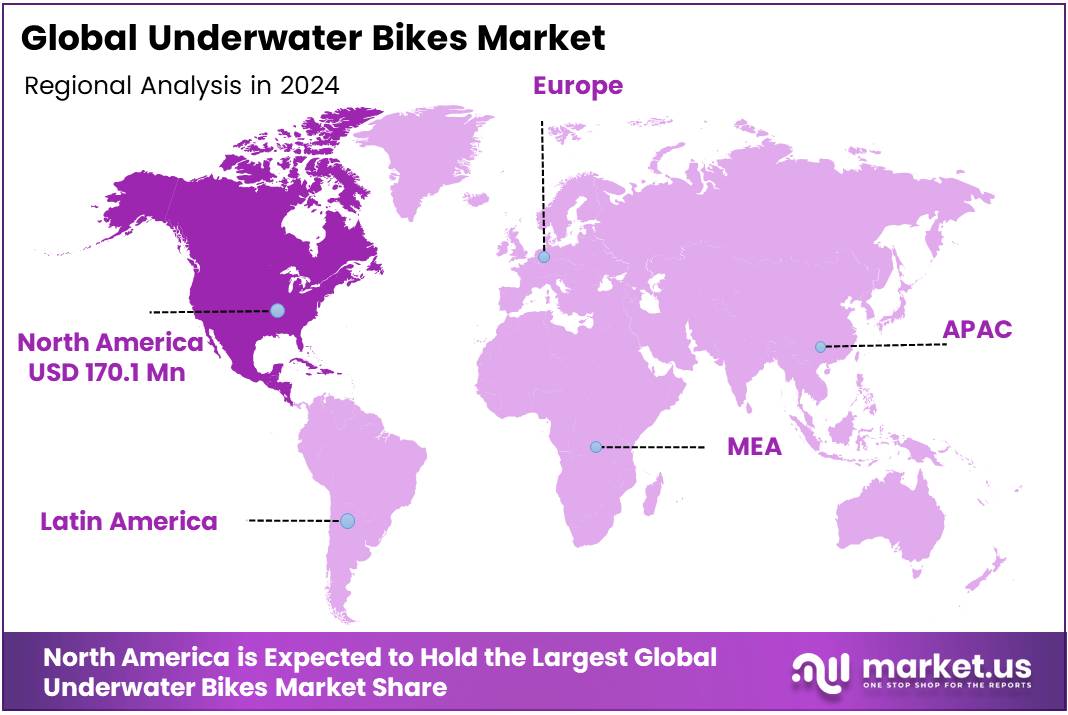Global Underwater Bikes Market Size, Share, Growth Analysis By Type (Manual, Electric), By Application (Recreational Use, Scientific Research, Search & Rescue Operations, Underwater Tourism, Others), By Region and Companies - Industry Segment Outlook, Market Assessment, Competition Scenario, Statistics, Trends and Forecast 2025-2034
- Published date: Sep 2025
- Report ID: 160106
- Number of Pages: 387
- Format:
-
keyboard_arrow_up
Quick Navigation
Report Overview
The Global Underwater Bikes Market size is expected to be worth around USD 507.9 Million by 2034, from USD 374.3 Million in 2024, growing at a CAGR of 3.1% during the forecast period from 2025 to 2034.
The Underwater Bikes Market is an emerging segment within aquatic fitness and leisure industries, offering innovative underwater cycling solutions. These bikes enable low-impact cardiovascular workouts while providing muscle toning benefits. Increasing consumer awareness regarding water-based fitness activities is driving demand, particularly across resorts, rehabilitation centers, and aquatic gyms.

With rising interest in health-focused tourism, underwater bikes have gained attention for offering immersive and entertaining exercise experiences. Fitness centers are adopting these products to enhance wellness offerings, especially in regions promoting hydrotherapy. Additionally, continuous product innovation in ergonomic design and corrosion-resistant materials is strengthening the market’s technological advancement.
Furthermore, governments in coastal regions are promoting aquatic recreation as part of sustainable tourism programs. Public investments in sports infrastructure and underwater activity zones are encouraging adoption. Regulatory frameworks emphasizing safety, durability, and eco-friendly materials are shaping product development, ensuring enhanced user trust and international compliance.
Growing disposable income and evolving consumer preferences toward luxury fitness are unlocking new market opportunities. Manufacturers are collaborating with hospitality chains to integrate underwater bikes into premium spa facilities. Moreover, technological integration such as smart resistance systems and digital tracking enhances user engagement, creating avenues for premium pricing.
The global wellness movement is creating a positive outlook, as water-based cycling offers joint-friendly workouts and recovery support. Medical practitioners increasingly recommend such exercises for rehabilitation, boosting commercial and therapeutic applications. This trend, coupled with the expansion of water fitness studios, is propelling market penetration across developed and developing economies.
According to an industry report, Hydrobikes can operate safely in 4–5 foot waves, reflecting their durability and adaptability for various aquatic conditions. Additionally, average speed ranges from 4–6 mph, reaching up to 10 mph, underscoring their performance and efficiency for recreational and professional users. These factors highlight strong market potential for both leisure and fitness applications.
Key Takeaways
- The Global Underwater Bikes Market is projected to reach USD 507.9 Million by 2034, up from USD 374.3 Million in 2024, registering a CAGR of 3.1% during 2025–2034.
- In 2024, Manual underwater bikes dominated the By Type segment with a 59.2% market share, driven by affordability, easy use, and eco-friendly design.
- In 2024, Recreational Use led the By Application segment, accounting for 45.8% of the market, supported by rising interest in aquatic sports and underwater tourism.
- North America emerged as the leading regional market in 2024, capturing 45.5% share and valued at USD 170.1 Million.
By Type Analysis
Manual dominates with 59.2% due to its cost-efficiency, simple mechanics, and suitability for beginners.
In 2024, Manual held a dominant market position in the By Type Analysis segment of the Underwater Bikes Market, with a 59.2% share. Manual underwater bikes are preferred for their affordable pricing and easy operation without complex electronic components. They appeal to fitness enthusiasts and recreational users seeking a low-maintenance, eco-friendly underwater cycling experience in aquatic fitness centers and resorts.
Moreover, manual bikes enhance cardiovascular strength and endurance while minimizing joint strain, making them ideal for therapeutic and rehabilitation activities. Their simple design also reduces repair and maintenance costs, making them highly accessible to commercial pool operators and individual buyers alike.
In contrast, Electric underwater bikes are gaining attention for their innovative propulsion systems that support extended underwater rides with less effort. These models appeal to professional divers, adventure parks, and tourism operators offering premium underwater experiences. Although priced higher, their demand is rising in high-income regions where technology-driven aquatic sports are becoming a lifestyle trend.
Electric variants also integrate sensors and digital dashboards to track performance metrics, promoting interactive underwater workouts. With increasing R&D investments, electric models are expected to capture a higher market share over time, especially in luxury and tourism-based applications.
By Application Analysis
Recreational Use dominates with 45.8% due to growing interest in aquatic fitness and leisure tourism.
In 2024, Recreational Use held a dominant market position in the By Application Analysis segment of the Underwater Bikes Market, with a 45.8% share. This segment benefits from expanding health-conscious populations and increasing interest in aquatic sports and underwater adventure tourism. Resorts, wellness centers, and luxury spas increasingly incorporate underwater cycling for fitness and fun.
Meanwhile, Scientific Research applications use underwater bikes to study biomechanics, aquatic resistance training, and rehabilitation techniques. These bikes help researchers analyze muscle performance, buoyancy effects, and hydrotherapy benefits, supporting the development of advanced underwater exercise equipment and physiotherapy programs.
In Search & Rescue Operations, underwater bikes serve specialized training programs, helping divers enhance strength, mobility, and endurance for underwater missions. These applications are niche but crucial, especially in coastal and defense sectors focused on underwater preparedness.
Furthermore, Underwater Tourism is rapidly growing as operators introduce unique underwater biking tours, allowing participants to explore marine environments safely. This experience-driven segment attracts adventure travelers, promoting sustainable underwater recreation.
Lastly, the Others category includes military fitness programs, aquatic rehabilitation, and competitive sports training. With technological integration and safety innovations, these diverse applications continue to expand market potential across industries.

Key Market Segments
By Type
- Manual
- Electric
By Application
- Recreational Use
- Scientific Research
- Search & Rescue Operations
- Underwater Tourism
- Others
Drivers
Rising Popularity of Aquatic Fitness and Rehabilitation Programs Drives Market Growth
The Underwater Bikes Market is witnessing steady growth due to the rising preference for aquatic fitness and rehabilitation programs. Health-conscious consumers are shifting towards low-impact workouts that reduce joint stress while improving cardiovascular strength. These bikes provide resistance-based training in water, supporting muscle recovery and promoting post-injury rehabilitation, especially among athletes and elderly individuals.
Moreover, the integration of smart tracking and resistance technologies is enhancing the appeal of underwater bikes. Modern equipment now features digital consoles, waterproof sensors, and customizable resistance levels, allowing users to monitor progress and optimize training efficiency. These innovations are attracting fitness enthusiasts seeking real-time feedback and advanced training solutions within aquatic environments.
Additionally, growing tourism activities and the rise of underwater leisure experiences are fueling demand. Resorts, marine theme parks, and coastal recreation centers are increasingly installing underwater bikes to enrich wellness offerings. Such installations cater to adventure-seekers and tourists desiring unique underwater fitness experiences.
Furthermore, the expansion of wellness and spa centers globally is creating new avenues for adoption. As spa operators aim to differentiate their offerings, they are incorporating hydro-fitness tools like underwater bikes to attract premium clientele. The integration of fitness and relaxation services positions these centers as holistic wellness destinations, driving consistent market growth.
Restraints
Limited Awareness and Accessibility in Developing Economies Restrain Market Growth
Despite growing popularity in developed regions, the Underwater Bikes Market faces hurdles due to limited awareness and accessibility in emerging economies. Many consumers in these regions are unaware of aquatic fitness benefits or lack access to suitable pool facilities, restricting adoption rates significantly.
Additionally, technical challenges related to water resistance and durability hinder widespread adoption. Designing bikes that can withstand prolonged exposure to chlorine, saltwater, and varying temperatures requires high-quality materials and advanced engineering. These factors increase production costs, which, in turn, elevate product prices for end-users.
Space constraints in pools further limit installations, especially in urban wellness centers or small-scale spas. Not all facilities have sufficient depth or area to accommodate multiple underwater bikes, reducing scalability for group training sessions.
Together, these challenges restrict market expansion in cost-sensitive and infrastructure-limited regions. Without targeted awareness campaigns, infrastructure support, and cost-optimized models, the potential of underwater bikes remains underutilized. Overcoming these barriers is essential for global market penetration and balanced regional growth.
Growth Factors
Integration of Virtual Reality and Immersive Training Environments Creates Growth Opportunities
The Underwater Bikes Market holds promising opportunities through the integration of virtual reality (VR) and immersive training experiences. Combining aquatic cycling with VR can enhance engagement, allowing users to visualize underwater landscapes or simulate scenic routes, improving motivation and workout consistency.
Expanding into luxury resorts and cruise ship wellness facilities offers lucrative growth prospects. These establishments continuously seek innovative experiences to attract high-value guests. Underwater bikes align perfectly with their focus on premium, experiential wellness offerings that merge fitness, relaxation, and entertainment.
Furthermore, collaboration with physiotherapy centers can strengthen medical applications. Rehabilitation experts recognize underwater cycling’s low-impact benefits for joint recovery, muscle strengthening, and cardiovascular therapy. Strategic partnerships can help standardize therapeutic programs, driving institutional adoption.
Lastly, the rising demand for customizable and portable underwater bikes opens avenues in home-use and boutique fitness studios. Manufacturers developing lightweight, foldable, and ergonomically designed products will appeal to individuals seeking flexibility and convenience, expanding the consumer base beyond commercial facilities.
Emerging Trends
Adoption of Eco-Friendly Materials and Corrosion-Resistant Designs Emerging as Key Trends
A notable trend in the Underwater Bikes Market is the adoption of eco-friendly materials and corrosion-resistant structures. Manufacturers are increasingly using marine-grade stainless steel, recycled composites, and non-toxic coatings to enhance longevity while meeting sustainability goals. This aligns with global shifts toward environmentally responsible fitness equipment.
The influence of social media fitness trends and rising popularity of aquatic workouts is also shaping consumer behavior. Fitness influencers showcasing underwater cycling routines are inspiring audiences to explore hydro-based exercises, boosting demand among millennials and wellness enthusiasts.
Simultaneously, the growth of home-based aquatic fitness solutions is driving product innovation. With rising interest in at-home wellness, consumers are investing in compact pools and fitness setups, fueling demand for smaller, user-friendly underwater bikes.
Additionally, manufacturers are focusing on compact, foldable, and ergonomically advanced models to cater to space-conscious buyers. These innovations combine convenience, aesthetics, and performance, ensuring widespread appeal across residential and commercial users. Such evolving design trends underline the market’s shift toward personalization and sustainability.
Regional Analysis
North America Dominates the Underwater Bikes Market with a Market Share of 45.5%, Valued at USD 170.1 Million
In 2024, North America emerged as the leading region in the Underwater Bikes Market, capturing a 45.5% market share and valued at USD 170.1 Million. The dominance is driven by strong consumer awareness of aquatic fitness, increasing adoption in rehabilitation centers, and robust infrastructure for recreational water sports.
The U.S. and Canada are witnessing higher integration of underwater fitness equipment across luxury resorts and wellness clubs, further fueling growth. Moreover, favorable climate conditions and a rising focus on innovative water-based workouts contribute to regional expansion.

Europe Underwater Bikes Market Trends
Europe holds a substantial share of the underwater bikes market, supported by a strong wellness culture and government-backed health initiatives. Countries such as France, Germany, and Italy are integrating aquatic fitness equipment into spas and therapy centers. The growing elderly population and demand for low-impact fitness options continue to boost product adoption.
Asia Pacific Underwater Bikes Market Trends
The Asia Pacific region is witnessing rapid growth, fueled by rising tourism activities, expanding hospitality infrastructure, and growing awareness of water-based fitness. Countries like Japan, Australia, and China are increasingly incorporating underwater bikes into luxury resorts and fitness clubs. Economic development and growing disposable incomes also enhance market potential.
Middle East and Africa Underwater Bikes Market Trends
In the Middle East and Africa, market growth is being propelled by tourism-driven demand and luxury resort installations. The increasing number of wellness retreats in the UAE and Saudi Arabia supports product visibility. However, limited public awareness and high equipment costs may moderate short-term adoption.
Latin America Underwater Bikes Market Trends
Latin America shows steady growth, driven by emerging fitness trends and investments in aquatic leisure facilities. Countries such as Brazil and Mexico are promoting water-based tourism and wellness activities. However, market penetration remains in early stages due to lower awareness and limited access to advanced fitness infrastructure.
Key Regions and Countries
North America
- US
- Canada
Europe
- Germany
- France
- The UK
- Spain
- Italy
- Rest of Europe
Asia Pacific
- China
- Japan
- South Korea
- India
- Australia
- Rest of APAC
Latin America
- Brazil
- Mexico
- Rest of Latin America
Middle East & Africa
- GCC
- South Africa
- Rest of MEA
Key Underwater Bikes Company Insights
In 2024, Aqua Body Strong continues to strengthen its presence in the global underwater bikes market by focusing on innovation and training-led engagement. The company offers a range of durable and performance-driven aquatic bikes that cater to wellness, fitness, and rehabilitation programs. Its commitment to enhancing user experience through structured aquatic workouts positions it as a key contributor to market expansion.
Aqua Creek maintains steady growth with its expertise in aquatic rehabilitation and accessibility equipment. By diversifying into underwater cycling solutions, the company taps into demand from therapy centers, spas, and aquatic fitness facilities. Its focus on quality, safety, and user-friendly designs helps reinforce brand credibility across institutional and individual customer segments.
Dynamika emphasizes technological innovation and compact design to address the needs of urban aquatic facilities. Its products are engineered for versatility, supporting both high-intensity workouts and therapeutic exercises. The company’s approach to integrating resistance features and ergonomic designs enhances its competitiveness in the mid-range product segment.
Fitmax strategically targets value-conscious consumers and emerging markets with cost-effective underwater bikes. The brand focuses on durability and functional simplicity, appealing to small gyms, hotels, and home pool owners seeking affordable fitness solutions. This approach allows Fitmax to expand its footprint in developing regions where aquatic fitness adoption is gradually rising.
Collectively, these companies reflect diverse strategic priorities—ranging from premium innovation to affordability and therapy-focused solutions—driving the evolving dynamics of the global underwater bikes market in 2024.
Top Key Players in the Market
- Aqua Body Strong
- Aqua Creek
- Dynamika
- Fitmax
- Hexagone Manufacture
- Hydrorider
- New Atlas
- Schiller Bikes
- Sublue
- U-Boat Worx
Recent Developments
- In May 2025, an advisor who attempted to evade federal authorities using an underwater scooter pleaded guilty to orchestrating a massive $35 million Ponzi scheme, marking a dramatic end to a high-profile financial fraud case. The plea highlights increasing scrutiny on unconventional escape attempts in financial crimes.
- In April 2024, LEFEET P1 achieved remarkable crowdfunding success, securing $515K on Kickstarter. The funding milestone reflects strong consumer interest in innovative underwater mobility solutions and positions LEFEET P1 as a standout product in the aquatic tech and recreation segment.
Report Scope
Report Features Description Market Value (2024) USD 374.3 Million Forecast Revenue (2034) USD 507.9 Million CAGR (2025-2034) 3.1% Base Year for Estimation 2024 Historic Period 2020-2023 Forecast Period 2025-2034 Report Coverage Revenue Forecast, Market Dynamics, Competitive Landscape, Recent Developments Segments Covered By Type (Manual, Electric), By Application (Recreational Use, Scientific Research, Search & Rescue Operations, Underwater Tourism, Others) Regional Analysis North America (US and Canada), Europe (Germany, France, The UK, Spain, Italy, and Rest of Europe), Asia Pacific (China, Japan, South Korea, India, Australia, and Rest of APAC), Latin America (Brazil, Mexico, and Rest of Latin America), Middle East & Africa (GCC, South Africa, and Rest of MEA) Competitive Landscape Aqua Body Strong, Aqua Creek, Dynamika, Fitmax, Hexagone Manufacture, Hydrorider, New Atlas, Schiller Bikes, Sublue, U-Boat Worx Customization Scope Customization for segments, region/country-level will be provided. Moreover, additional customization can be done based on the requirements. Purchase Options We have three licenses to opt for: Single User License, Multi-User License (Up to 5 Users), Corporate Use License (Unlimited User and Printable PDF) 
-
-
- Aqua Body Strong
- Aqua Creek
- Dynamika
- Fitmax
- Hexagone Manufacture
- Hydrorider
- New Atlas
- Schiller Bikes
- Sublue
- U-Boat Worx










